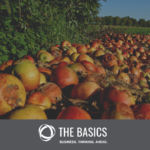- |
African countries can thrive amidst climate change. But the international community needs to support a Just Transition. Climate expert Eunice Sampson explains.
What if “waste” could be a resource?
That’s the vision of the “Circular Economy.” It’s a model where resources are recovered and reused and waste is reduced.
This approach creates environmental and economic value. There are opportunities for innovation, with byproducts and other materials that can be used for high value applications.
Sustainability isn’t automatic with the circular economy, notes NBS Director Jury Gualandris. But when circular products and processes are properly configured, they can “avoid waste disposal, reduce extraction of new material, and improve economic efficiency.”
The circular economy can happen at many levels: within a single company, across businesses, and across cities and countries. No matter which level you’re operating at, NBS can help you on the journey, with models, examples, and strategic tips.
African countries can thrive amidst climate change. But the international community needs to support a Just Transition. Climate expert Eunice Sampson explains.
Companies have choices when they enter the circular economy. Learn which business models make economic and environmental sense.
The circular economy takes a special form in low-income settings. It’s driven by individuals and emphasizes labour and resourcefulness over technological solutions. Its implementation has lessons for everyone.
The circular economy could reduce food waste and make agrifood more sustainable. But solutions aren’t automatic.
More frequent wildfires are damaging grapes in California. Wineries are sourcing grapes from more vineyards to reduce risk – and it’s paying off.
Oil and gas companies communicate about their ‘ambitious’ climate goals. But they are not taking nearly enough action.
Small farmers are an important part of the food system, but they’re struggling. What should businesses and consumers do?
Join a global discussion on best practices for teaching climate change in business schools. Get inspired by new approaches and share your experience. Series begins Jan 25.
The circular economy could reduce food waste and make agrifood more sustainable. But solutions aren’t automatic.
Being aware of our unconscious beliefs gives us new opportunities to behave sustainably. A business scholar and parenting coach explain.
Empathy is a skill needed for business and society. Goa Institute of Management shares its innovative strategy for developing empathy in business students.
The corporate reporting landscape can be overwhelming. This article describes key types of annual reports and advice for choosing among them.
Greenwashing harms the planet and can hurt your company’s bottom line. Here’s how to make your sustainability claims accurate.
Art and music can spark imagination, drive emotion, and create meaning. Businesses can use this power to advance sustainability.
International migration is part of our world. Businesses have a central role in managing this workforce. Learn more from the experts.
Business school students want to create sustainability impact. Here’s how educators can help students drive change.
Carbon reporting is becoming mandatory for many companies. Find out how your can get ready to disclose its carbon emissions and policies.
After NBS issued a statement on the Ukraine War, stakeholders weighed in. Director Jury Gualandris shares lessons about crisis response.
Carbon reporting isn’t a perfect system. But it can help you to lower climate-related financial risk, spur innovation and reduce emissions.
Conscious consumerism can mean more sustainable impact. But it’s a goal companies and consumers need to achieve together.
Engaging through the Network for Business Sustainability is better than ever. Check out our new capabilities.
Learn what science says about climate change’s causes, impacts and solutions — especially for business.
The circular economy supports sustainability by enabling economic growth without greater resource use. Learn how it works.
More frequent wildfires are damaging grapes in California. Wineries are sourcing grapes from more vineyards to reduce risk – and it’s paying off.
Oil and gas companies communicate about their ‘ambitious’ climate goals. But they are not taking nearly enough action.
Small farmers are an important part of the food system, but they’re struggling. What should businesses and consumers do?
Join a global discussion on best practices for teaching climate change in business schools. Get inspired by new approaches and share your experience. Series begins Jan 25.
The circular economy could reduce food waste and make agrifood more sustainable. But solutions aren’t automatic.
Being aware of our unconscious beliefs gives us new opportunities to behave sustainably. A business scholar and parenting coach explain.
Empathy is a skill needed for business and society. Goa Institute of Management shares its innovative strategy for developing empathy in business students.
The corporate reporting landscape can be overwhelming. This article describes key types of annual reports and advice for choosing among them.
Greenwashing harms the planet and can hurt your company’s bottom line. Here’s how to make your sustainability claims accurate.
Art and music can spark imagination, drive emotion, and create meaning. Businesses can use this power to advance sustainability.
International migration is part of our world. Businesses have a central role in managing this workforce. Learn more from the experts.
Business school students want to create sustainability impact. Here’s how educators can help students drive change.
Carbon reporting is becoming mandatory for many companies. Find out how your can get ready to disclose its carbon emissions and policies.
After NBS issued a statement on the Ukraine War, stakeholders weighed in. Director Jury Gualandris shares lessons about crisis response.
Carbon reporting isn’t a perfect system. But it can help you to lower climate-related financial risk, spur innovation and reduce emissions.
Conscious consumerism can mean more sustainable impact. But it’s a goal companies and consumers need to achieve together.
Engaging through the Network for Business Sustainability is better than ever. Check out our new capabilities.
Learn what science says about climate change’s causes, impacts and solutions — especially for business.
Food waste is an ethical and an environmental problem. It’s also a business opportunity, ready for innovative solutions.

Maya Fischhoff, Abby Litchfield
| November 28, 2023
Companies have choices when they enter the circular economy. Learn which business models make economic and environmental sense.

Heeseung Kim
| March 17, 2021
The circular economy supports sustainability by enabling economic growth without greater resource use.

Heeseung Kim
| May 14, 2021
Food waste is an ethical and an environmental problem. It’s also a business opportunity, ready for innovative solutions.